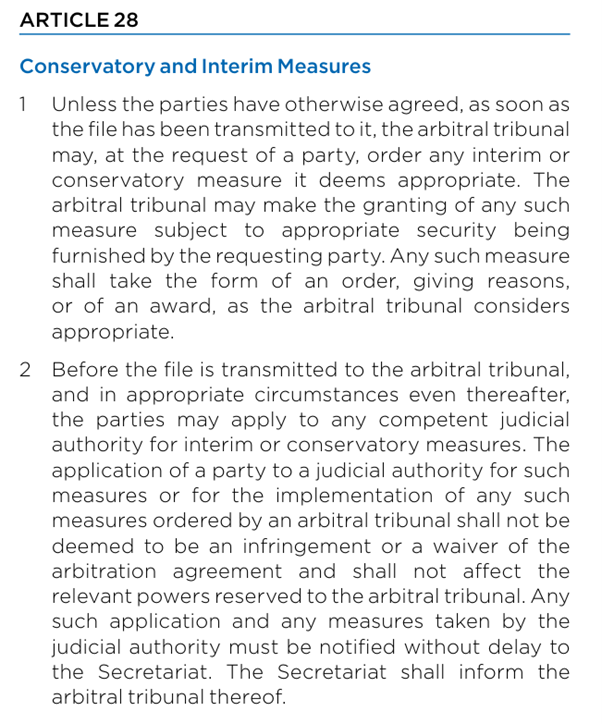Conservative and interim measures (sometimes called provisional measures) represent an important tool in international arbitration designed to protect the parties’ interests while awaiting the resolution of their dispute via a final award. These measures may often appear essential “[o]wing to the time gap between the commencement of the arbitration, the substantive hearing and the final award [during which] events may occur that cause irreparable and uncompensable harm to a party, evidence may disappear, or a party may attempt to place assets beyond reach.”[1]
In ICC arbitration, conservatory and interim measures may be ordered by the arbitral tribunal pursuant to Article 28(1) of the 2021 ICC Arbitration Rules, which reads as follows:

The arbitral tribunal may rule on any request for conservatory and interim measures “as soon as the file has been transmitted to it” by the ICC Secretariat. Prior to the transmittal of the file to the arbitral tribunal, a request for conservatory and interim measures might be lodged with competent national courts and authorities, as specified in Article 28(2) of the 2021 ICC Arbitration Rules, which must be “notified without delay to the Secretariat”. Such a request shall, however, “not be deemed to be an infringement or a waiver of the arbitration agreement and shall not affect the relevant powers reserved to the arbitral tribunal.” Parties may also seize an emergency arbitrator as per Article 29 of the 2021 ICC Arbitration Rules.
Types of Conservative and Interim Measures in ICC Arbitration
Article 28(1) of the 2021 ICC Arbitration Rules does not specify any particular category of conservative and interim measures that the arbitral tribunal may order. It leaves the matter to the arbitral tribunal’s discretion, merely stating that the arbitral tribunal may order “any interim or conservative measure it deems appropriate.”
In practice, as indicated in The Secretariat’s Guide to ICC Arbitration, parties typically seek the following conservatory and interim measures:[2]
- Measures to protect the status quo pending the resolution of the dispute;
- Measures to preserve evidence;
- Security for costs;
- Measures to secure enforcement of the award by preserving assets likely to be required to satisfy a subsequent award; and
- Orders for interim payment.
Requirements for Applications for Conservative and Interim Measures to Be Granted in ICC Arbitration
Article 28(1) of the 2021 ICC Arbitration Rules does not specify any particular requirements necessary for granting conservatory and interim measures. Again, it leaves this matter to the arbitral tribunal’s discretion.
The Secretariat’s Guide to ICC Arbitration point outs that arbitral tribunals generally refer to the following basic requirements:
- A threat of irreparable harm that “no alternative form of relief, whether monetary or otherwise, could adequately repair” (it should be noted that this creates a high hurdle, as monetary relief can adequately repair much harm);[3]
- Prima facie jurisdiction over the merits of the claim to which the request for conservative and interim measures relates;[4]
- In some instances, an arguable case on the merits.[5]
Arbitral tribunals may also take into consideration the provisions of the arbitration law at the place of arbitration. Despite several exceptions,[6] many national arbitration laws are based on the UNCITRAL Model Law on International Commercial Arbitration whose Article 17A sets forth the following requirements that any request for interim measures must meet:
The party requesting an interim relief under Article 17(2)(a), (b) and (c) shall satisfy the arbitral tribunal that:
(a) Harm not adequately reparable by an award of damages is likely to result if the measure is not ordered, and such harm substantially outweighs the harm that is likely to result to the party against whom the measure is directed if the measure is granted; and
(b) There is a reasonable possibility that the requesting party will succeed on the merits of the claim. The determination on this possibility shall not affect the discretion of the arbitral tribunal in making any subsequent determination.
Compliance with Decisions on Conservative and Interim Measures in ICC Arbitration
Pursuant to Article 28(1) of the 2021 ICC Arbitration Rules, decisions on conservative and interim measures may take the form of either an order or an award, which are binding on the parties in accordance with Articles 22(5)[7] and 35(6).[8] Such compliance is usually voluntary.[9]
In case of non-compliance, however, as noted in The Secretariat’s Guide to ICC Arbitration, although arbitral tribunals do not have coercive powers similar to state courts to enforce orders and awards, they “have strong persuasive powers: parties will be more disposed to comply with an order than risk irritating or alienating an arbitral tribunal through non-compliance. Whether arbitral tribunals may impose penalties for non-compliance will usually depend on the relevant applicable law.”[10]
[1] J. Fry, S. Greenberg and F. Mazza, The Secretariat’s Guide to ICC Arbitration, 2012, para. 3-1032.
[2] J. Fry, S. Greenberg and F. Mazza, The Secretariat’s Guide to ICC Arbitration, 2012, para. 3-1037.
[3] J. Fry, S. Greenberg and F. Mazza, The Secretariat’s Guide to ICC Arbitration, 2012, para. 3-1037.
[4] J. Fry, S. Greenberg and F. Mazza, The Secretariat’s Guide to ICC Arbitration, 2012, para. 3-1039.
[5] J. Fry, S. Greenberg and F. Mazza, The Secretariat’s Guide to ICC Arbitration, 2012, para. 3-1037.
[6] See, e.g., International Arbitration in the Czech Republic (Czechia), Aceris Law, 7 September 2022.
[7] 2021 ICC Arbitration Rules, Article 22(5): “The parties undertake to comply with any order made by the arbitral tribunal.”
[8] 2021 ICC Arbitration Rules, Article 35(6): “Every award shall be binding on the parties. By submitting the dispute to arbitration under the Rules, the parties undertake to carry out any award without delay and shall be deemed to have waived their right to any form of recourse insofar as such waiver can validly be made.”
[9] J. Fry, S. Greenberg and F. Mazza, The Secretariat’s Guide to ICC Arbitration, 2012, para. 3-1044.
[10] J. Fry, S. Greenberg and F. Mazza, The Secretariat’s Guide to ICC Arbitration, 2012, para. 3-1044.
